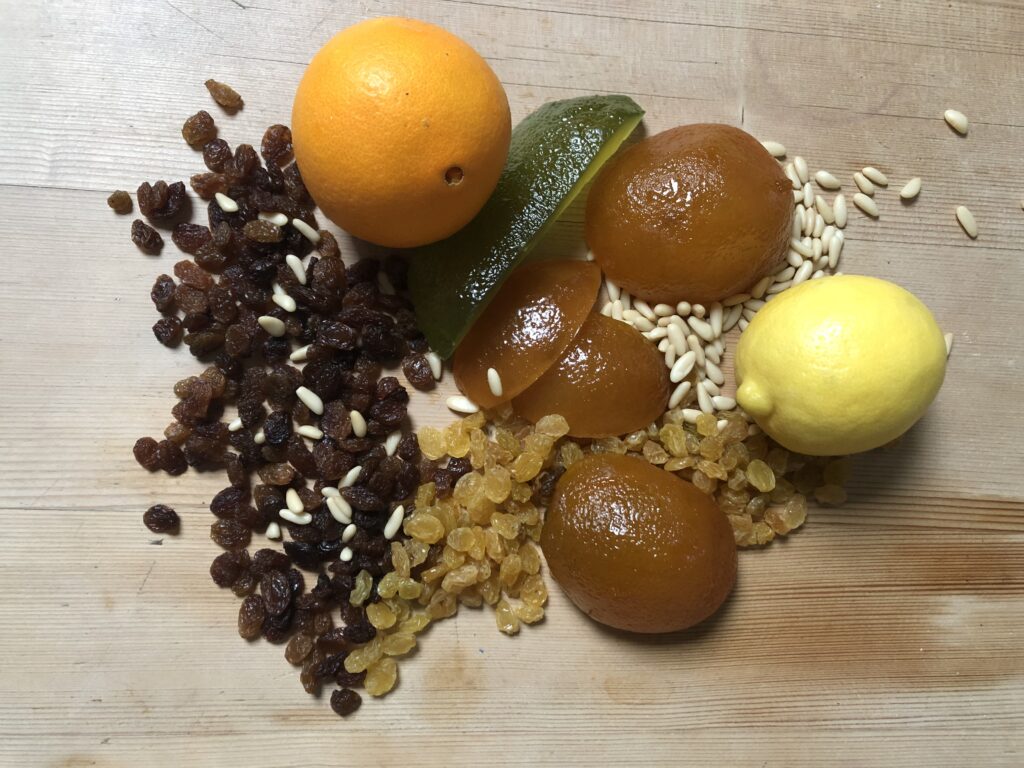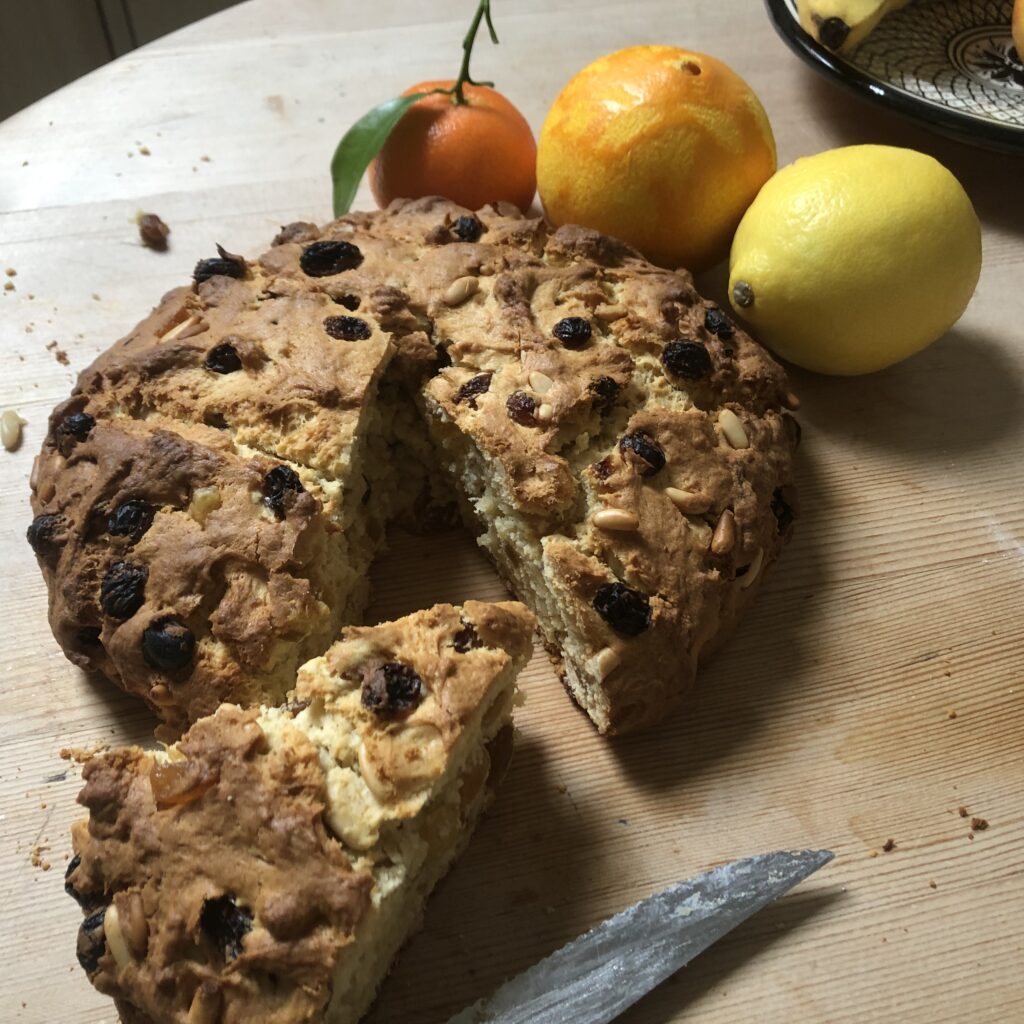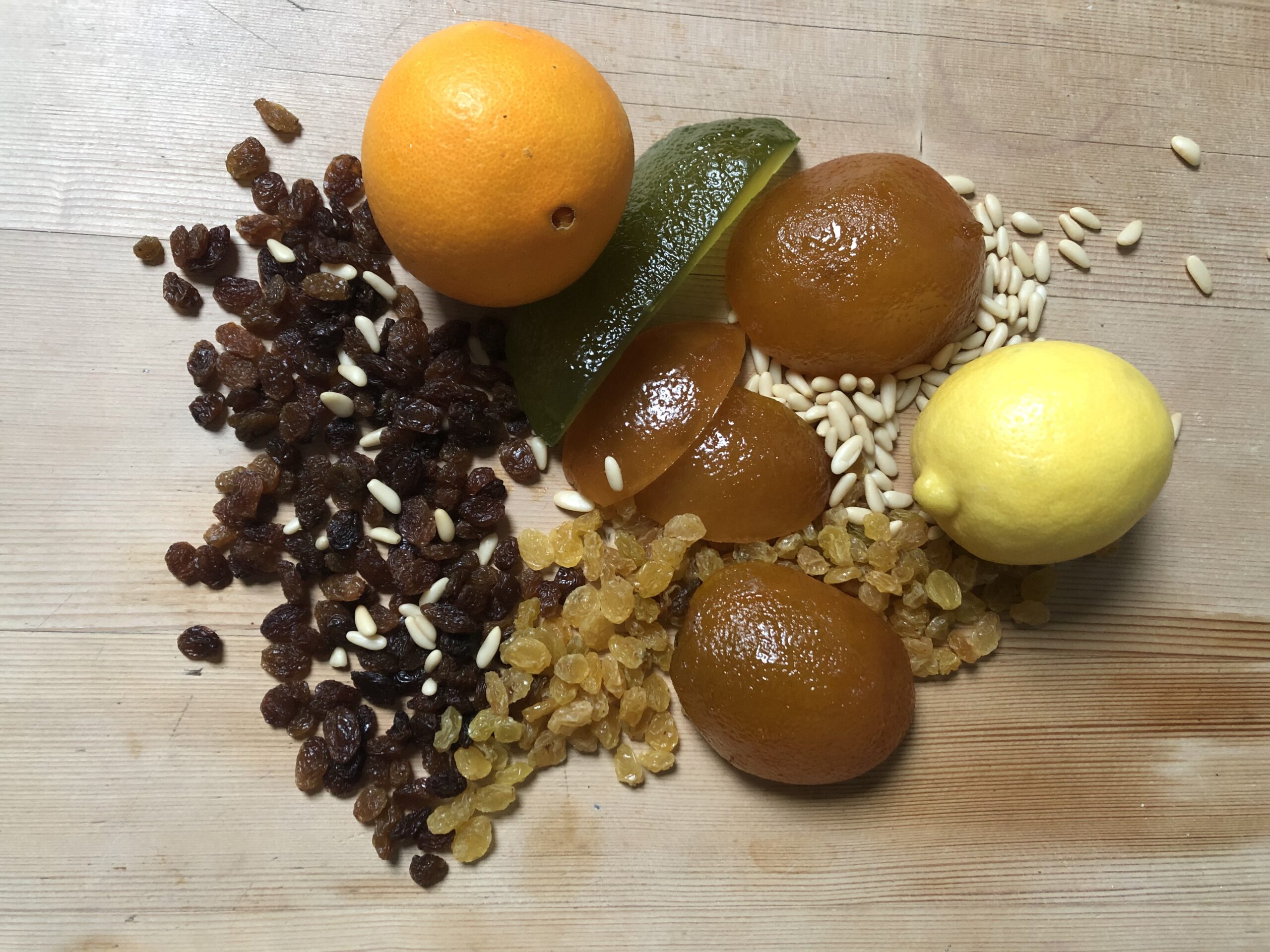A Christmas tale and recipe for traditional Genoese panettone

Levanto
In the summer of 1972, a Bentley inched up the winding road towards my village and stopped where the asphalt ended, around a kilometer away. Colonel Lloyd Lowel and his new friends Jacques and Elene Malan stepped out of the car to survey the cluster of ancient houses sunk into the slope.
“So what do you think?” Jacques asked.
The Colonel peered through his binoculars. “Bloody marvelous. It looks like Saint-Paul-de-Vence.”
“Without the hefty price tag, I am sure,” added Elene.
The three of them thrashed through the brush with sticks to warn the vipers of their mission, and the fortune of the village was forever changed.
First, the Colonel bought every abandoned ruin he could get his hands on from Signor de Franchi, the pharmacist in Levanto, who had no interest in living with impoverished peasants up in the hills without a proper road to escape.
After choosing the largest one overlooking the sea for himself, he invited the Malans out to dinner to celebrate his good fortune at the Ristorante la Colomba. The prosecco and oysters slid down the smooth throats of his guests with such grace that he was overcome with a desire to feed them until end of his days. To hold onto the moment, he offered them the ruin with the garden stretching to the well. Jacques and Elene accepted his gift with just the right dose of humility, and the Colonel made a toast to their future.
“To the beginning of a very special relationship,” he said.
The three of them clinked their glasses.
Jacques turned to the Colonel. “We are truly indebted to you. As you well know, the Times will no longer publish my articles. There is no room in the world for true progressive thinking…”
The Colonel put his glass on the table, then took both of their hands in his.
“You need to promise me two things.”
Jacques and Elene squeezed his hand back, before knowing the conditions.
“I don’t want to hear any more of that Marxist twaddle, and please, never grow old.”
Elene gave the Colonel a dazzling smile, then looked over at Jacques, worried. “Poor Elene,” the Colonel thought. “She still has the face to launch a thousand ships and shouldn’t take my last remark to heart. Jacques will age better, but she will be better company as time goes by. ”
Jacques insisted on paying for dinner, but could not quite find enough coins for the tip. Touched by his effort, the Colonel dropped some lire on the table with a flourish, then accompanied them back to their hotel, where he settled their outstanding bill.
Later that night, he called his longtime companion, who was playing a minor, but fascinating character in a Visconti film. “I can’t wait for you to meet them, George. They are perfect in every way. ”
Having led British troops through Italy during World War II, the Colonel knew that the best way to devastate a town was to bomb its connecting roads. When he saw the contadini riding their donkeys down the steep path to Levanto, he hired every young man in the village to lay the final kilometer of asphalt that would multiply the value of their own homes tenfold overnight. “The authorities be damned! They have neglected these people for too long,” he replied to anyone who warned him that he might receive a fine from the local government.
The Colonel and George were particular about the company they kept, and only sold the renovated ruins to aristocrats or people who could make good conversation at dinner. Possessing both of these attributes guaranteed immediate acceptance. All of the new members of this Shangri La needed maids, gardeners, and cooks, and the local contadini were more than happy to oblige.
The party lasted a good ten years, and no one was more upset than the Malans when the Colonel and George were killed in an automobile accident in South Africa. Again, they would need to depend on the kindness of strangers.
December 2018
“I paid for everything. Medical bills, food, heating, and taxes all came out of my pocket for many years,” says Armando.
“That was good of you. I am sure that she appreciated it.” I reply.
I am visiting my new neighbour, who has just inherited the house we are sitting in from Elene Malan. I cannot help but covet the living room floor, which is made of black slate and white marble rhombi from a 15th century church in Tuscany. How she and her late husband Jacques procured this national treasure is a mystery, but the charming and the beautiful always seem to get by.
Armando throws open an antique wardrobe with the finest walnut veneer and pulls out a mink coat.
“But I drew the line last year when she wanted me to buy her a new fur at the age of 85.”
He lays the coat on the sofa and strokes the lining.
“I double stitched my best Shantung silk inside this coat after a ten-hour day in my shop.”
“You do beautiful work. I hear that you made her entire wardrobe.” I say.
He nods, then looks out the window into the garden that stretches all the way to the old well. “In my experience, clothes usually wear the woman. Elene wore the clothes.”
As I slice onions for dinner later on in my kitchen, I think about this afternoon’s visit. Armando is an outsider. The aristocrats left in the village are aghast that a mere tailor from town has inherited Jacques and Elene’s house, and he senses this. He wanted me to think of him as an honorable man, who had not taken advantage of Elene. I arrived here after the era of grandeur and excess, so I do not judge him. These bluebloods may have enjoyed Jacques and Elene’s elegance and wit during the cocktail hour, but none of them was ready to bankroll their lifestyle after the Colonel’s tragic death. Jacques died soon afterwards, so what did Elene do? She turned to the man who knew every curve on her body for shelter.
A week later, as I walk along the path below Armando’s garden, I spot him wrapping a line of Christmas lights around one of the columns on his terrace. “God, he’s organized. At least I’ve done my cards,” I think to myself. We wave to each other and I walk up the steep road out of the village. At the top, I notice a truck and a flash Alfa Romeo parked outside of his gate. A man in overalls steps out of the garden, carrying a single black stone and places it onto some blankets in the back of the truck.
“Oh God, no,” I cry. When I told Armando how much I had always admired Elene’s floor, he just shrugged and said that he found it somber and that its cold, uneven surface was giving his poodle arthritis.
How could he do this? The fool! I run into his garden and onto his terrace, where he is now hanging a star between the columns.
“Are you out of your mind, Armando?”
Armando looks at me, confused. “I beg your pardon?”
I peer through the French doors into the living room. A man in a designer suit is standing over a stonemason, who is carving out the second stone.
I turn to Armando, alarmed. “You have got to stop them, now!”
“But why? Bizzi the architect advised me that wood will be warmer,” Armando replies.
“That floor is worth more than your house. Is this man even paying you anything?”
Armando hesitates, then admits, “Well, no…but he is offering me a discount on the oak.”
I burst out laughing. “He is fleecing you! Get rid of them, now!”
“But the planks are already cut!” Armando puts his hand to forehead in distress. “What can I do?”
I throw the French doors open. Before the stonemason can lower his chisel back into the stone, I shout, “Stop! I am buying the floor.” Bizzi looks at me in surprise. Armando enters the living room, and folds his arms across his chest.
“Signor Bizzi, I am sorry, but I must re-evaluate our agreement,” he says. “Signora Rossana has made me an offer I cannot refuse…”
The three men begin to argue amongst themselves. I take this opportunity to run back to the truck and order the man in overalls to bring the stone back down to Armando’s house.
“And who are you?” he asks.
“Do as I say, or I will report you all to the Comune delle Belle Arti,” I threaten. The man grumbles to himself, but obeys.
Washing my dishes after dinner, I curse myself for getting involved. “What was I thinking? I don’t have the money to pay for a national treasure! If Armando asks the Comune delle Belle Arti to ascertain its value, they might start an investigation into Jacques and Elene’s louche dealings, then slap him with fines and back taxes. I’ve made a real mess for someone that I barely know…”
My door knocker raps three times, and I sigh. It can only be him, wanting to seal the deal. I open the door, and he walks in, bearing a pandolce genovese.
“I made it myself this afternoon,” he says, then hands it to me.
I ask him to sit down in the living room, then hurry to the kitchen to put the cake on a plate.
“Maybe a stiff glass of Schiacchetrà will soften the blow when I tell him I’m skint,” I think.
Back in the living room, I cut into the crumbly cake while he pours the liquor into our glasses.
“I never had a pandolce until moving here,” I say. “I am not a baker, but I would love to give it a go.” Nervous, I take a little bite. The currants are soft with booze.
“It is easy. I will give you the recipe,” he says.
“He will never darken this door again,” I think.
Armando clears his throat. “I hate to disappoint you, Rossanna, but I might as well be straight.”
“Yes?” I hold my breath.
“You were very kind this afternoon, but I have decided not to sell you the floor.”
I breathe a sigh of relief. “Oh, thank God. I could never have paid you what it is worth. I was afraid that you were making a mistake.”
He picks up his glass and stares at the caramel colored liquor.“In the end, it isn’t about the money,” he says.
“No?”
He keeps his eyes on his drink, avoiding my gaze. “If I sell the floor to you, the entire village will laugh behind my back,” he replies.
I almost choke on the cake. “Oh, surely you don’t think…”
Armando waves away my feeble protests. “Cin cin,” he smiles, then clinks my glass.
At Christmas, we all want to belong.
In the summer of 1972, a Bentley inched up the winding road towards my village, and stopped where the asphalt ended, around a kilometer away. Colonel Lloyd Lowel and his new friends Jacques and Elene Malan stepped out of the car to survey the cluster of ancient houses sunk into the slope.
“A sort of bread-dough cake filled with raisins and candied fruits is eaten all over Italy during the Christmas season, under such names as panettone, panforte, and panspeziale, depending on the region. The Genoese name, rendered in dialect as pandöce, is the most direct: this really is sweet bread. The origins of pandolce and its relatives are very old. Some scholars trace a similar confection back to ancient Persia. In Genoa, pandolce’s immediate ancestor was known as pan de mangiä e spüa, which meant bread to eat and spit, because the dried raisins inside still had pips.” Colman Andrews, from his book “Flavours of the Riviera.”
Pastry shops in Liguria now offer light, leavened pandolce as a nod to the popular Milanese panettone, but the dense, traditional one is always on sale as well. I like them all. Pandolce is not as rich or as sweet as a stollen, so it is particularly good with coffee in the morning, or tea in the afternoon.
When the Ligurians make pandolce at home, they use baking powder to cut through all of the leavening drama. I have come up with my own version, based on my friend Giuliana’s recipe, and the one Colman Andrews gives in his book Flavours of the Riviera. The crumbly, buttery dough is quite forgiving and even a child can put this together. You can add as many dried and candied fruits as you please. If you can get your hands on artisanal candied peel, now is the time to splurge. I bought my whole winter supply at Schwarzenbach for only CHF 9. Pine nuts are traditional, but if you cannot find them, there is no crime in using hazelnuts or almonds.
A few notes on flavorings:
Use what you have in your pantry.
Colman Andrews adds 4 teaspoons of orange flower water and no booze. I am sure that this is marvellous, but I never have this in the house.
Many traditional recipes suggest a shot of Marsala. I used port, because this is what I had on hand. Pull out the dark rhum if you feel the urge. Giuliana, a teetotaler, only uses milk, and her version is just fine.
You can use lemon rind (the most traditional) or orange rind, depending on your taste.
The Ingredients
100 to 150 grams mixture of currants and sultanas
100 grams unsalted butter
100 grams sugar
1 egg
50 ml (4 tablespoons) milk
1 rounded tablespoon of honey (optional)
2 teaspoons of vanilla
300 grams of flour
10 grams (2 teaspoons) of baking powder
1 pinch of salt
50 to 100 grams of candied orange, lemon and/or bergamot peel
The grated peel of one fresh lemon or one orange
50 ml port (4 tablespoons), marsala or rhum (or more milk if not using alcohol)
50 grams of pine nuts
The Method
Soften your raisins, currants and/or sultanas at least 30 minutes beforehand in warm water.
Preheat oven to 180 degrees centigrade.
In a large mixing bowl, beat the butter and sugar together until well blended, then stir in the egg until the mixture is smooth.
Heat the milk in a small saucepan until warm, but do not let it boil. Stir into the butter mixture. Add the honey and vanilla and stir. In a separate bowl, stir the flour, baking powder and salt together, then pour this into the butter mixture. Mix the dough with a large wooden spoon for a minute or knead with your hands until it becomes smooth and firm.
Take the sultanas out of the water, gently squeeze out excess moisture, then add to the dough, along with the candied peel, orange zest, liquor and pine nuts. Mix everything into the dough until well distributed.
The dough should be quite sticky. Shape it into a disk around 8 inches in diameter. Place on a baking sheet covered with parchment. With a knife, cut a tic tac toe pattern on the diagonal into the top of the dough.
Bake for approximately 30 minutes, or until a knife comes out clean. The crust will be quite dark. Pandolce tastes even better the next day.


